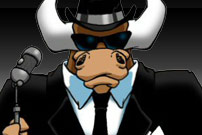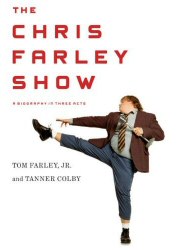 With the temperature dropping, it's time to find someone to keep you warm. Find your hookups with our online dating guide!
With the temperature dropping, it's time to find someone to keep you warm. Find your hookups with our online dating guide!
A Biography in Three Acts
- Biography
- 2008
- Buy the book
Reviewed by Jeff Giles
()
o some, the idea of a Chris Farley biography might seem more than a little pointless: he was, after all, just another of the many “Saturday Night Live” alumni who made the jump from the small screen to mediocre feature films in the ‘90s – and one whose epic appetite for drugs and alcohol led to a death that, though sad and untimely, occurred at a point in his career when it seemed as though the apex of his cinematic oeuvre might end up being “Tommy Boy.” What did he do, really, to deserve 300-plus pages?
As it turns out, “Tommy Boy” did go down as the best movie Chris Farley ever made, and not even a 15-year buildup of nostalgia can make some of his less inspired “SNL” skits funny. But whether or not you believe in Farley’s talent, there’s no denying that he lived an amazing life and touched a lot of people along the way – or that his awful death at the age of 33 was a stunningly stupid waste of potential.
Compiled by Farley’s oldest brother Tom with the assistance of Tanner Colby (who previously collaborated with John Belushi’s widow on a book titled simply “Belushi”), “The Chris Farley Show” lives up to its title, presenting the late comedian’s life in three acts which culminate, unfortunately, with his death from an accidental overdose in December of 1997. To get there, Colby and the elder Farley use over 130 interviews with Chris Farley’s family members, friends, and co-workers, framing his story in a series of brief vignettes recounted by the likes of David Spade, Alec Baldwin, John Goodman, Tim Meadows, and Lorne Michaels. The oral history method worked well for another “SNL”-related book, James A. Miller and Tom Shales’ “Live from New York” (although Bob Odenkirk obviously didn’t think so, as he refers to it as “that fucking book” here, and its authors as “dicks”), and it proves useful here, too; not only is the reader able to see Farley’s exploits from several different points of view in rapid succession, but it breaks his story down into such bite-sized nuggets that the book quickly becomes almost impossible to put down.
It’s also very moving – perhaps surprisingly so, if all you remember of Farley’s work is the seemingly unbroken string of loudly bellowing buffoons he portrayed on “SNL” and in his movies. But to his fans – and many of his peers – Farley’s work had an uncommonly strong human touch and a tender streak a mile wide. The best example of this – repeatedly referenced throughout “The Chris Farley Show” – is the “SNL” skit that this book takes its name from, in which Farley conducted a series of fawning interviews with celebrities such as Jeff Daniels, Martin Scorsese, or, most famously, Paul McCartney. On the surface, the skits seemed like just another excuse for Farley to make a lot of money while acting like an idiot – but for those who were really paying attention, they offered a brief glimpse into his untapped capabilities.
Sadly, he never had a chance to tap them. At the time of his death, Farley was doing voicework for “Shrek” (a job that ultimately went to Mike Myers) and trying to convince insurers that he was a safe bet for a David Mamet-scripted Fatty Arbuckle biopic, both of which could have moved his career in new directions – but he was also smarting from the experience of filming the creatively bankrupt “Black Sheep” (which Paramount essentially forced him to make) and “Beverly Hills Ninja” (for which he was offered a salary so high that his father told him to ignore the stupid script). It’s suggested here that making those films helped push Farley off the wagon after three years of sobriety, but looking at his life in the long view, it’s difficult to imagine many happy endings for him; given his deep insecurities, his family background, the wealth he accrued at such a young age, and the second chances afforded him thanks to his talent and charming personality, he just didn’t have enough incentive (or, perhaps, strength) to reverse his downhill slide.
But lest you assume Chris Farley fits the picture of the stupidly insensitive addict we’ve been presented with so many times, “The Chris Farley Show” shows you the other side – the Farley whose deep religious convictions motivated countless hours spent volunteering and untold monetary donations, and whose naked vulnerability drew stars such as Baldwin, Goodman, and Tom Arnold into his orbit. (There’s a beautiful anecdote toward the end of the book, about Goodman at Farley’s funeral, that will absolutely break your heart.) Even as he pissed away his gifts, and his life, and burned most of the bridges he’d built with friends and co-workers, he never stopped wanting to help people – and people never stopped wanting to help him. They just didn’t know how anymore.
Its final act hinges on the lowest of low notes, but “The Chris Farley Show” isn’t a downer of a book; rather, it’s a celebration of a life and career that, though brief and one-dimensional, could have been much more. Even if you weren’t a fan, it’s a sadly fascinating read.
You can follow us on Twitter and Facebook for content updates. Also, sign up for our email list for weekly updates and check us out on Google+ as well.











